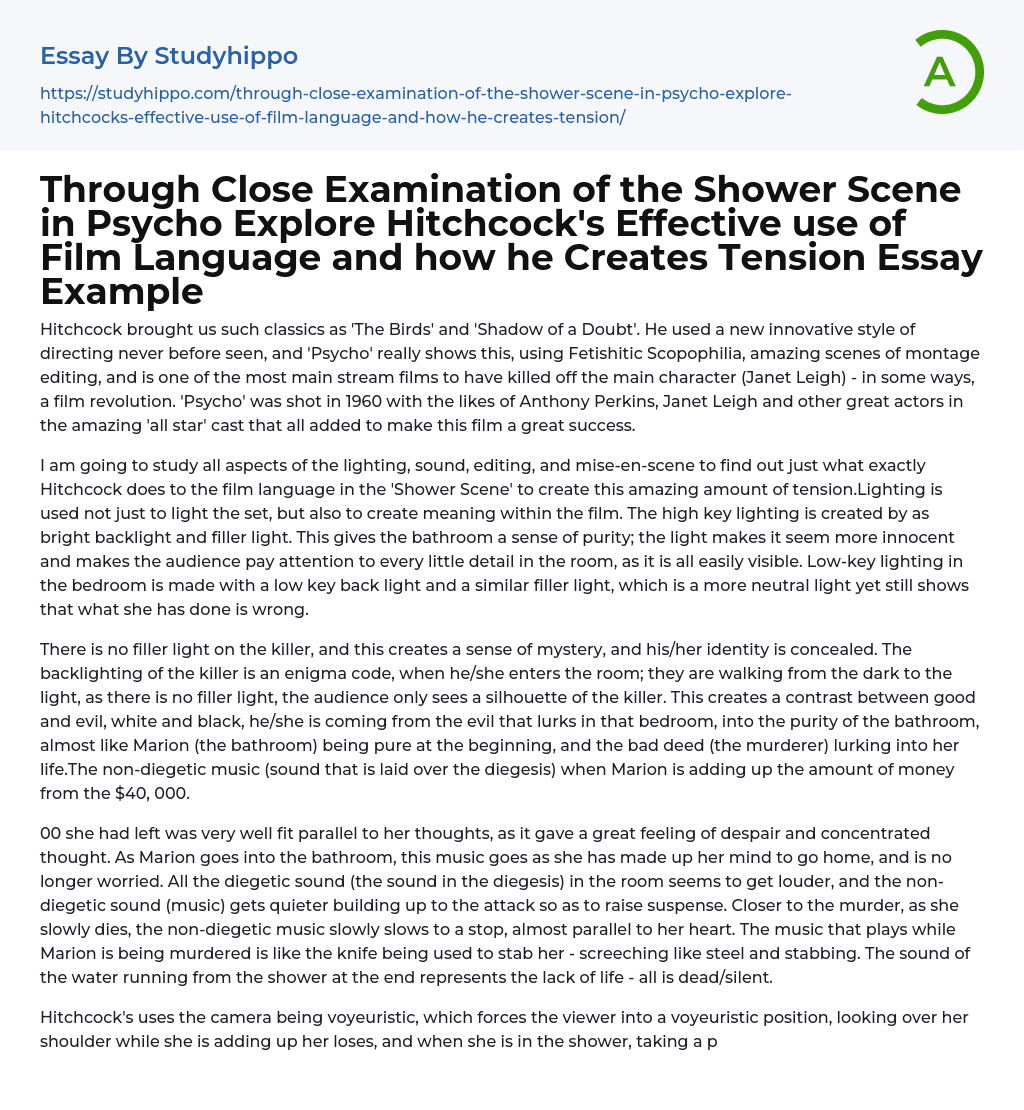Hitchcock revolutionized film with innovative directing techniques, evident in classics such as 'The Birds' and 'Shadow of a Doubt'. 'Psycho', shot in 1960 with an all-star cast including Anthony Perkins and Janet Leigh, showcases his use of Fetishitic Scopophilia and amazing montage editing, making it one of the most mainstream films to kill off the main character. In many ways, 'Psycho' was a film revolution.
In my study, I will investigate the lighting, sound, editing, and mise-en-scene in Hitchcock's 'Shower Scene' to better understand how he creates such high levels of tension. The lighting serves to not only illuminate the set but also to convey meaning within the film. To achieve high key lighting in the bathroom, a bright backlight and filler light are used to create a sense of purity and innocence. This lighting draws the audience's attention to ev
...ery minute detail of the room. Low-key lighting in the bedroom is created using a low key backlight and a neutral filler light. This effectively conveys the wrongness of the protagonist's actions while maintaining a sense of neutrality.The absence of filler light on the killer's silhouette generates a sense of mystery and concealed identity. The backlighting serves as an enigma code, with the killer entering from darkness to light, and only a silhouette being visible due to the lack of filler light. This contrast of good and evil, white and black, is reminiscent of Marion's purity in the bathroom being threatened by the lurking evil in the bedroom. Furthermore, non-diegetic music accompanies Marion as she calculates the $40,000, adding to the suspenseful atmosphere.
The parallel fit of the room's ambiance to Marion's thoughts evokes despair and concentration.
As Marion enters the bathroom, the diegetic sound intensifies while the non-diegetic sound lowers, indicating her resolve to return home. The elevation of suspense is achieved by the gradual increase of sound towards the climactic attack. The non-diegetic music dwindles to a stop concomitant to Marion's life slipping away, just like her heartbeat. The music during the murder scene mimics the stabbing knife - piercing and painful. The sound of running water from the shower signifies lifelessness - an eerie silence.
Hitchcock employs a voyeuristic camera technique, which compels the audience to adopt a voyeuristic stance, peering over the protagonist's shoulder as she tallies her losses and taking in every angle of her shower. The protagonist's decision-making process is captured in a mid shot as she enters the bathroom, providing a sense of distance and enabling the audience to fully appreciate her movements. The camera then captures close-ups of specific body parts - such as her hand flushing paper down the toilet and her legs entering the shower - exemplifying fetishistic scopophilia (using the camera to construct images for either male or female desire, in this case generating an illusion of nudity aimed at male viewers due to its sex appeal).
The shower scene in 'Psycho' showcases innovative editing techniques, particularly montage editing. The sequence revolves around three viewpoints: the killer, Marion, and the audience, each presented in a cycle. Moreover, there seems to be a fourth party involved – almost as if it were the shower itself – capturing Marion's good side. The editing style speeds up with the suspense and slows down with her demise. Meanwhile, Hitchcock carefully inserts jump cuts into and out
of Marion's mouth as she screams, a technique that could easily look amateuristic when executed poorly.
The Mise-En-Scene, which encompasses everything that the director has included in the frame to enhance its meaning, is telling. It shows bird predators such as owls and eagles outside the bathroom door, which is significant considering that Norman, the hotel owner, stuffs birds. This suggests that something has already happened or is about to happen, much like how he stuffed his mother. Meanwhile, an open suitcase in the bedroom reflects upon Marion's life; it contains everything that represents her and is open akin to how her emotions are exposed at the moment. As for film-specific elements, the black and white visuals were chosen for their effect rather than because Hitchcock was cheap. It makes the film feel more realistic and immersive since colour does not convey the seriousness of what is happening on-screen. In conclusion, this film is another classic from one of the greatest directors of all time.
The horror-thriller 'Psycho' is exceptional and cannot be improved. It boasts superb montage editing from the era, fantastic lighting and sound effects, and features the best actors for the job. Its fame is well-deserved.
- 12 Angry Men essays
- A beautiful mind essays
- A Separation essays
- Alfred Hitchcock essays
- American Beauty essays
- American Films essays
- Animation essays
- Avatar essays
- Blade Runner essays
- Bollywood essays
- Bond essays
- Bridge essays
- Cinema Of The United States essays
- Comedies essays
- David essays
- Dead Poets Society essays
- Do The Right Thing essays
- Documentary essays
- English-Language Films essays
- Erin Brockovich essays
- Film Analysis essays
- Film Editing essays
- Film Noir essays
- Film Techniques essays
- Finding Forrester essays
- Forrest Gump essays
- Gattaca essays
- Gladiator essays
- Glory essays
- Good Will Hunting essays
- Hamilton essays
- Hollywood essays
- Horror essays
- Jaws essays
- King kong essays
- Like Water For Chocolate essays
- Looking For Alibrandi essays
- Martin Scorsese essays
- Melodrama essays
- Monster essays
- Moulin rouge essays
- Movie Analysis essays
- Movie Review essays
- On The Waterfront essays
- One Flew Over The Cuckoo'S Nest essays
- Our day out essays
- Pearl Harbor (Movie) essays
- Persepolis essays
- Pornography essays
- Rabbit Proof Fence essays




